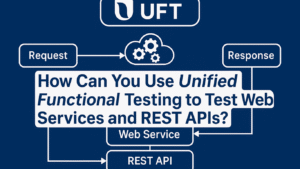Introduction
In the ever-evolving healthcare sector, ensuring the quality and reliability of software systems is paramount. For students aspiring to enter the realm of Quality Assurance (QA) testing, engaging in live healthcare projects offers invaluable hands-on experience. These real-world scenarios not only enhance technical proficiency but also cultivate critical problem-solving skills essential for the industry. By working on live projects, learners gain a deeper understanding of healthcare workflows, patient data management, and compliance requirements, thereby strengthening their healthcare domain knowledge. This exposure helps students identify potential system vulnerabilities, troubleshoot complex issues, and implement effective testing strategies. Moreover, live projects foster collaboration, adaptability, and decision-making abilities, preparing aspiring QA professionals to handle real-time challenges in hospitals, clinics, and healthcare IT organizations with confidence and precision.
Understanding the Role of QA in Healthcare
Quality Assurance in healthcare involves meticulous testing of software applications to ensure they meet stringent standards of functionality, security, and compliance. Given the sensitivity of patient data and the critical nature of healthcare services, robust QA processes are indispensable.
Key Aspects of Healthcare QA:
- Data Security: Ensuring patient information is protected against unauthorized access.
- Regulatory Compliance: Adhering to standards such as HIPAA and HL7.
- Interoperability: Guaranteeing seamless communication between different healthcare systems.
- Usability: Designing intuitive interfaces for healthcare professionals.
The Significance of Live Projects in QA Education
Engaging in live healthcare QA projects offers students a plethora of benefits:
1. Hands-On Experience
Students transition from theoretical knowledge to practical application, working on real-world healthcare applications. This exposure helps them understand the intricacies of healthcare systems and the challenges involved in testing them.
2. Enhanced Problem-Solving Skills
Live projects present unforeseen issues that require immediate attention, honing students’ ability to think critically and devise effective solutions. For instance, debugging a malfunctioning patient management system can sharpen analytical skills.
3. Familiarity with Industry Tools
Students gain proficiency in industry-standard tools such as Selenium, JUnit, and Bugzilla, which are essential for efficient QA testing.
- Understanding Regulatory Standards
Working on healthcare projects exposes students to the regulatory frameworks governing the industry, ensuring that they are well-versed in compliance requirements.
5. Team Collaboration
Students learn the importance of teamwork and communication, collaborating with developers, project managers, and other stakeholders to achieve project goals.
Real-World Applications and Case Studies
Case Study 1: CRM Automation in Healthcare
A U.S.-based healthcare data analytics company partnered with KPi-Tech to automate their CRM system. By implementing automated testing, the company achieved a fivefold increase in client onboarding speed, demonstrating the impact of QA on operational efficiency.
Case Study 2: EHR System Testing
In a project focused on Electronic Health Record (EHR) systems, students were tasked with validating data accuracy and system integration. Through rigorous testing, they identified critical issues that, if left unresolved, could have compromised patient safety.
Practical QA Testing Techniques in Healthcare
Students involved in live healthcare QA projects employ various testing methodologies to ensure comprehensive software quality. Functional Testing verifies that the software performs its intended functions accurately, while Performance Testing assesses the responsiveness, stability, and scalability of applications under different load conditions. Security Testing is critical in identifying vulnerabilities to safeguard sensitive patient data, and Usability Testing ensures that healthcare professionals can navigate and operate the software intuitively. By utilizing tools like Selenium for automation, JIRA for bug tracking, and other industry-standard platforms, students gain hands-on experience in managing and executing test cases effectively. Engaging in free QA training and placement in USA programs further enhances their practical skills, providing exposure to real-world project scenarios, best practices, and professional workflows. This combination of structured training and live project experience equips learners with the expertise needed to excel in healthcare software testing careers, fostering confidence and industry readiness.
Preparing Students for the QA Workforce
Live healthcare QA projects serve as a bridge between academic learning and professional employment. They provide students with a portfolio of work that showcases their skills to potential employers. Moreover, the experience gained enhances their problem-solving abilities, making them valuable assets in the QA field.
Key Takeaways
- Real-World Exposure: Students gain practical experience in healthcare QA testing.
- Skill Enhancement: Live projects develop critical problem-solving and technical skills.
- Industry Readiness: Students become well-versed in industry tools and regulatory standards.
- Career Advancement: Experience in live projects enhances employability in the QA sector.
Conclusion
Engaging in live healthcare QA projects equips students with the necessary skills and experience to excel in the competitive field of Quality Assurance. By bridging the gap between theoretical knowledge and practical application, these projects foster a new generation of professionals capable of ensuring the reliability and safety of healthcare software systems. Moreover, working on real-time projects exposes learners to the challenges and complexities of healthcare IT, helping them develop critical thinking, problem-solving abilities, and attention to detail. Many programs also integrate structured testing training and placement, ensuring that students not only gain hands-on experience but also receive guidance on industry standards, best practices, and career opportunities. This combination of practical exposure and professional support prepares students to confidently contribute to healthcare organizations, delivering software solutions that meet stringent compliance and quality benchmarks.














